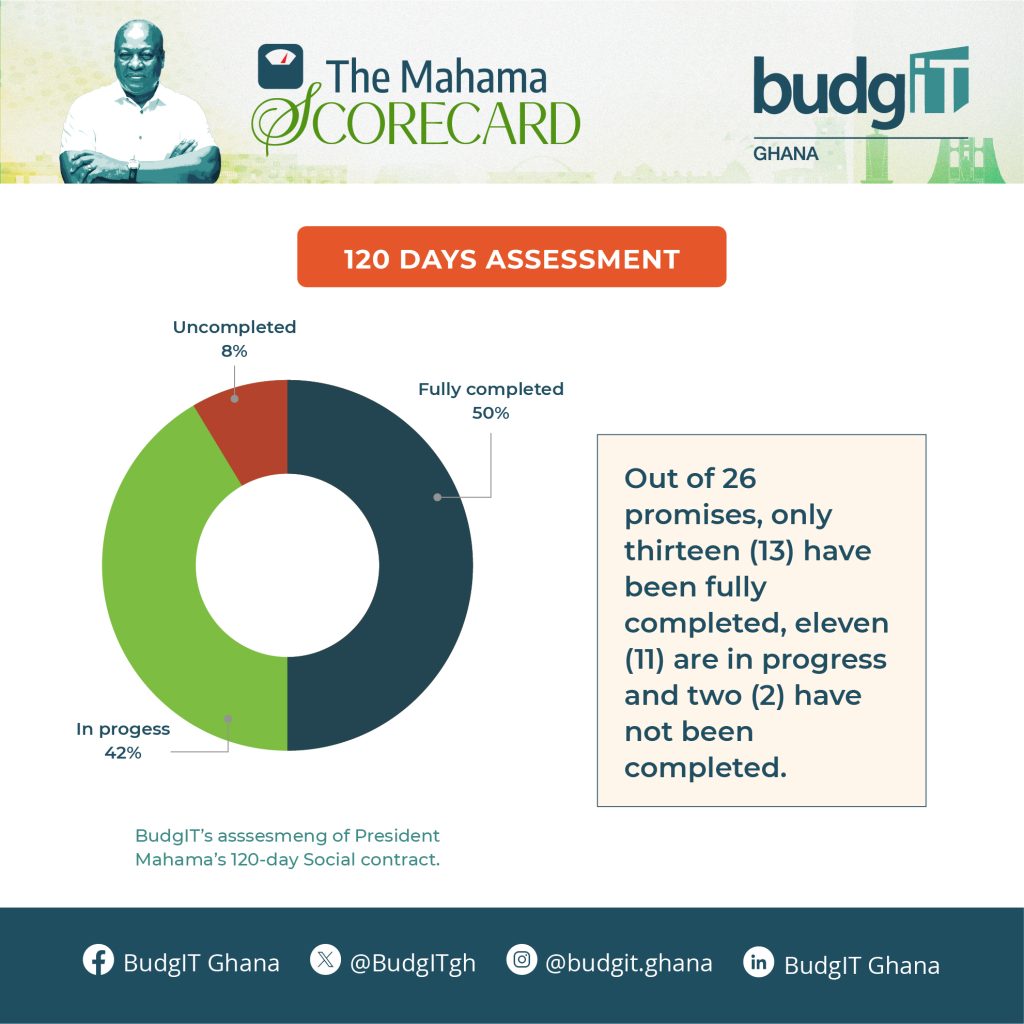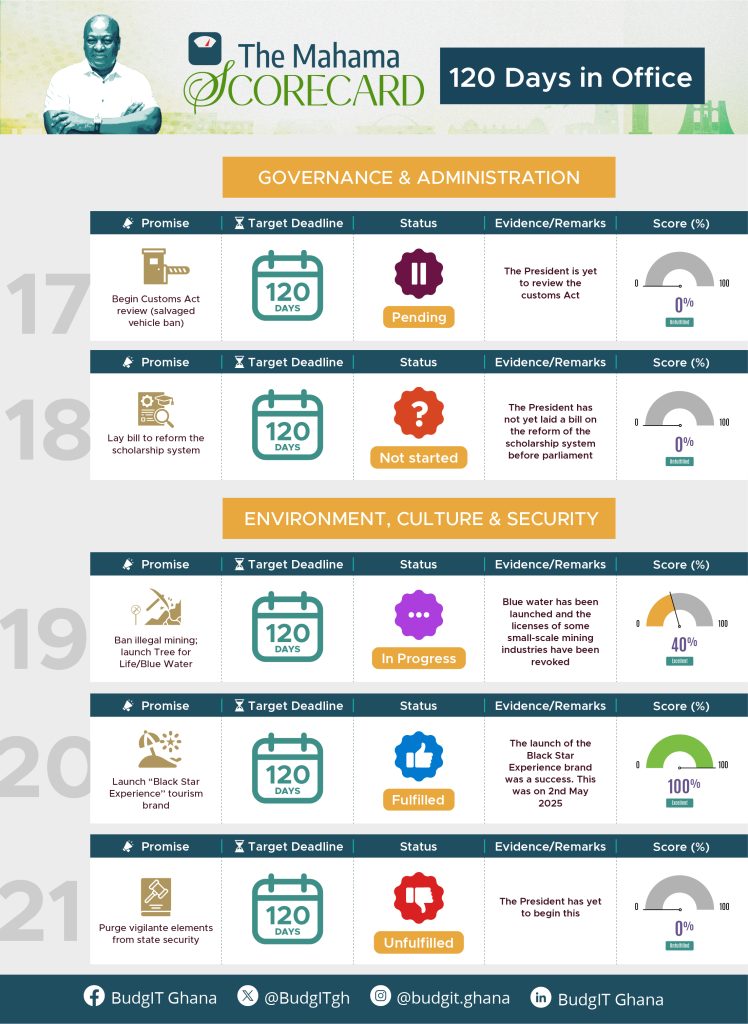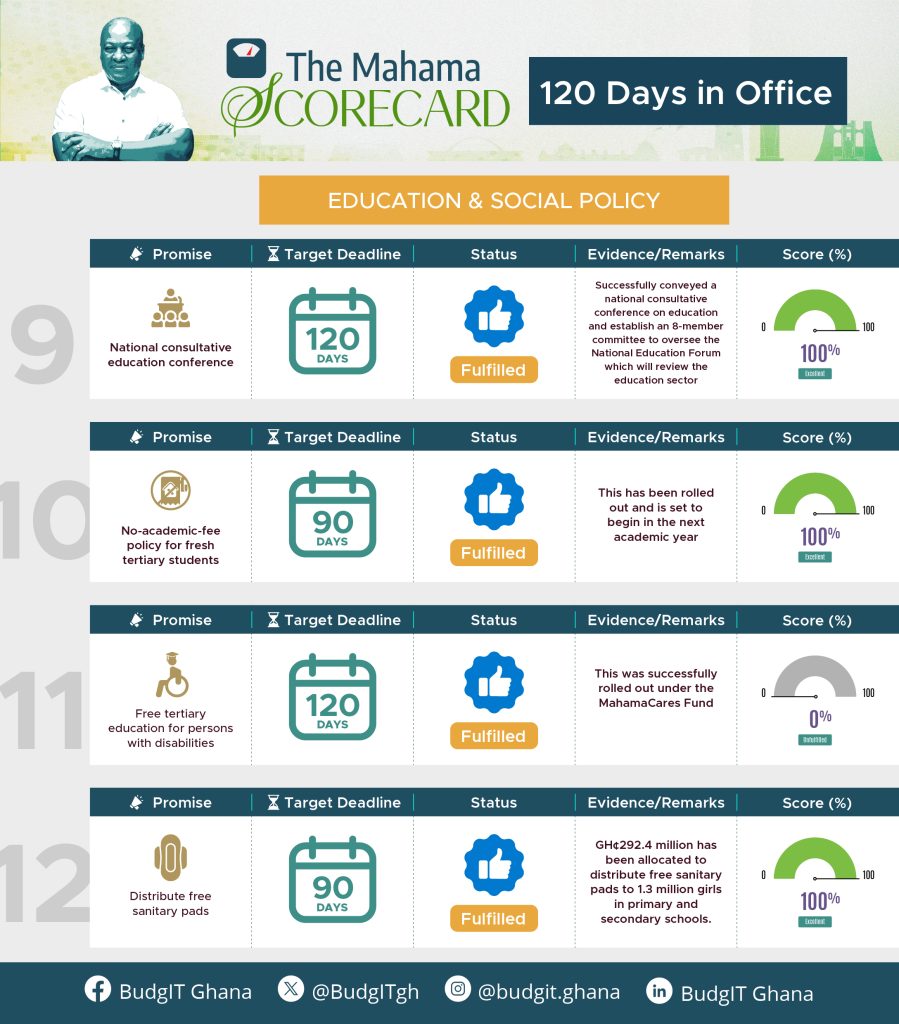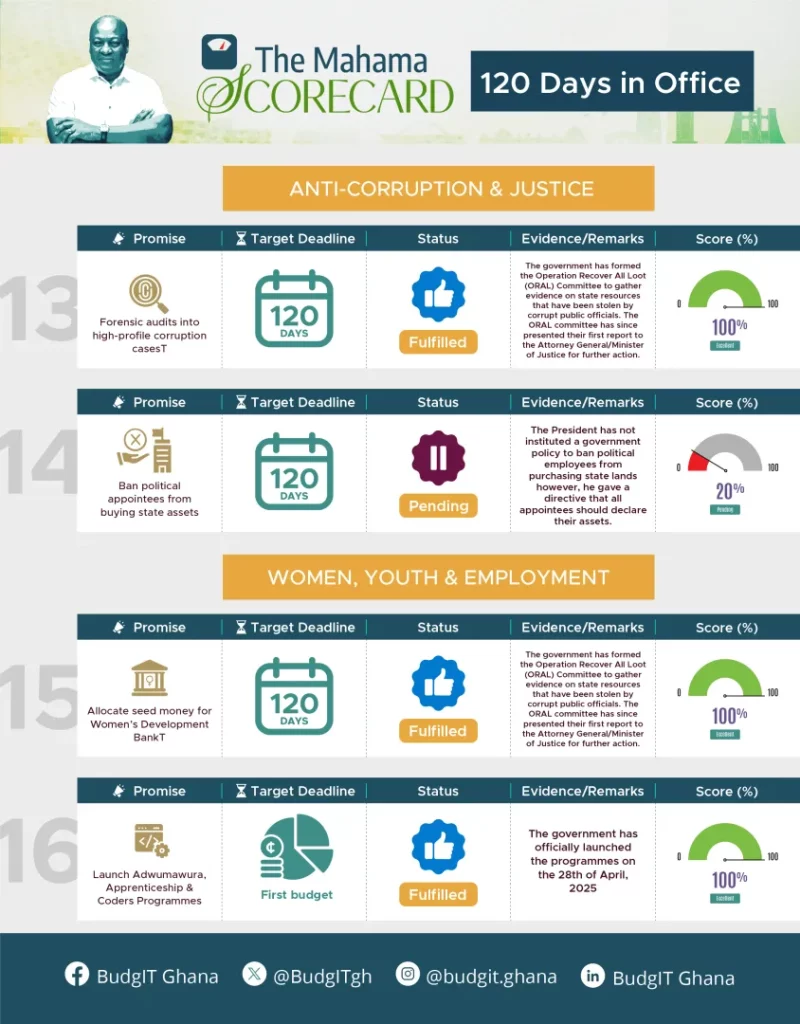Overview
His Excellency John Dramani Mahama made bold commitments to the citizens of Ghana, promising that he would fulfil all within his first 120 days in office. This 120-Day Social Contract was considered by most of the citizens as a measurable, time-bound pact with citizens. Following his success in the 2024 General Elections on 7th December 2024, he was elected President of the Republic of Ghana. John Dramani Mahama was sworn into office on the 7th of January 2025, marking the beginning of the 120 days he had promised to fulfil all the key commitments he had made in his 120-Day Social Contract.
The 120 days elapsed on 7th May 2025, and the President has rendered an account of his 120-day Social Contract. BudgIT Ghana has stepped in with a performance audit, and the results are as illuminating as they are sobering.
BudgIT Ghana categorised all 26 commitments made in the Social Contract into 8 categories. These categories are Governance and Administration, Economic and Fiscal Policy, Education and Social Policy, Anti-Corruption and Justice, Women, Youth and Employment, Trade and Infrastructure, Environment, Culture and Security and finally, Justice, Human Rights and Accountability.

BugIT Ghana’s Assessment
His Excellency John Dramani Mahama’s short-term roadmap was impressively comprehensive. It included 26 clearly defined promises across governance, economy, education, justice, infrastructure, and the environment. According to BudgIT Ghana, 17 commitments were fully delivered, 2 are ongoing, 1 is partially fulfilled, and 5 are yet to be acted upon. The highlights of President Mahama’s 120-Day Social Contract are in the governance, education, and social protection domains, where his government exemplified flawless implementation, with almost every promise being met within the timeline. Anti-corruption and justice reforms also picked up significant steam, with investigation committees and enforcement of asset declarations marking a recommitment to openness. However, the lowlights included the limited strides made towards economic restructuring, reform of the customs office, and public sector accountability, which are key to long-term national growth that has fallen behind within the 120-day period.
Governance and Administration
In the aspect of governance and administration, the President performed excellently. He nominated 46 cabinet ministers within 14 days of inauguration, showcasing effective leadership and organisational readiness. He also reorganised the government with a decrease in ministries from 30 to 23, indicating a firm commitment to efficiency and lean administration. The announcement of a Code of Conduct for public officials and appointees on 5th May 2025 also reflected the administration’s commitment to ethical leadership and institutional discipline. This shows a flawless performance in this category.

Economic Policy and Finance
President Mahama’s record in economic policy and finance was mixed, representing a combination of significant progress and notable shortcomings. Positively, the government convened the National Economic Dialogue successfully, and their proposals were factored into the 2025 National Budget and Economic Policy, evidencing a consultative and strategic planning strategy for the economy. Moreover, the administration kept to their commitment to cancel the E-Levy, the Betting Tax and the Emissions Levy, even though the COVID Levy has been retained, leaving that promise partially fulfilled. Nevertheless, important institutional changes, including import duty reviews that are key for the competitiveness of industry and agriculture, and the institution of the Accelerated Export Development Council (AEDC), are yet to be carried out, notwithstanding the minimal discussion made on these after the 120-day period. Whilst initial steps are being made to formulate a legal framework for the envisioned 24-Hour Economy, the process is in the beginning stages. Overall, the sector is shifting, but the absence of urgency in the introduction of more profound economic changes does not point to the momentum observed in the case of social policy being reached in economic transformation. However, the economic landscape of the country has seen considerable stability in recent weeks, indicating an upward adjustment.
Education and Social Policy
Moving on to education and social policy, President Mahama performed well in the 120 days. A high point was the successful holding of a National Education Conference that paved the way for long-term change and the setting up of a specific committee to coordinate sector-wide reforms. The government also introduced a historic policy of free education for persons with disabilities (PWDs), in addition to the exemption of fees for first-year students in the tertiary level, a critical move aimed at opening up the gates of higher education. Moreover, GH¢292.4 million was budgeted for the supply of free sanitary products to over 1.3 million school girls, greatly enhancing menstrual health care and school attendance. This across-the-board delivery not only proves the effective implementation of policies but also confirms Mahama’s commitment to social inclusivity, equity, and the provision of services to vulnerable groups.

Anti-Corruption and Justice
Furthermore, in anti-corruption and justice, the administration of President Mahama exhibited high intentions with supporting accomplishments. A landmark achievement was the formation of the Operation Recover All Loot (ORAL) Committee, which has already conducted investigations and opened prosecutions, including the high-profile National Signals Bureau scandal, the Ghost names in the National Service Secretariat documents and the investigations into the Skytrain Scandal. This is an indication of the renewed promise to hold people accountable for their misuse of state assets. A core pledge, to prohibit political appointees from buying state property, has also been realised in the code of conduct that was launched by the President. The administration has also emphasised the enforcement of asset declarations, going so far as to direct the forfeiture of salaries of non-compliant appointees to the Ghana Medical Trust Fund. These actions show encouraging progress and send the message of good governance, but they are short of instituting the systemic measures to institutionalise anti-corruption for the prevention of future misuse of power.

Women, Youth and Employment
In the category of women, youth and employment, the Mahama administration performed excellently, demonstrating strong and effective policies. One major high point was the provision of GH¢51.3 million in seed monies to set up a Women’s Development Bank, a long-promised initiative to advance financial inclusion and economic empowerment for women. Support for this was the impressive rollout of youth-focused initiatives like Adwumawura as well as the Apprenticeship and the Coders Initiative on April 28 2025, all aimed at reducing youth unemployment and developing the appropriate skills for the digital economy. These are strong measures that demonstrate a willingness to address both generation and gender-based inequalities in opportunities, and hold profound potential for long-term economic and social reform.
Trade Performance, Infrastructure, Environmental Governance, and Institutional Accountability
On the other hand, trade performance, infrastructure, environmental governance, and institutional accountability were patchy and, in the case of some, stagnant. There was limited progress in the trade and infrastructure area; neither the promised reform of the Customs Act regarding salvaged vehicles nor the reform of the scholarship system bill was initiated, leaving the long-term developmental vision of the administration in doubt. The environment, culture, and security portfolio was characterised by a mixed performance. The Blue Water project was rolled out and some illegitimate mining licenses were revoked, but thorough action against environmental degradation and vigilante groups in state security is absent. The “Black Star Experience” brand for tourism was successfully rolled out, being a cultural achievement, but deeper institutional changes are outstanding. On the justice, rights, and accountability front, although the investigations for the killings of people at elections were reopened and GH¢242.5 million was allocated to pay flood victims, the VRA dam spillover investigation and the reform of the state of emergency saw limited progress during the 120 day period. This exposed the large gap in respect of responsive intervention during a crisis, but an absence of momentum where institutional changes are concerned.
BudgIT Ghana’s Final Verdict and Recommendations
Overall, BudgIT Ghana scores President Mahama 72% on the fulfilment of his 120-Day Social Contract. BudgIT Ghana’s scores show high performance in governance, education, social policy, and justice, where almost all the promises were achieved within the timeframe. However, there remain significant weaknesses in economic restructuring, trade reforms and institutional accountability, where significant promises like customs reform, the establishment of the AEDC, and SOE shake-ups have seen no actual action. Although the 100% completion rate on the majority of social promises is to be commended, these were largely policy announcements and fiscal commitments, rather than ongoing structural changes.
BudgIT Ghana’s recommendations following our assessment of John Mahama’s 120 Days Social Contract are;
- Institutionalise Independent Oversight for SOEs
Loss-making State-Owned Enterprises (SOEs) must undergo performance audits with clearly outlined restructuring mandates. SOEs should sign quarterly performance contracts and be evaluated by independent boards, similar to models in Kenya and Malaysia. This will ensure fiscal discipline and public value from government-owned enterprises and employees.
- Build Equity and Sustainability into Social Intervention Policies
The design of social interventions must prioritise equity, access, and sustainability. Social interventions such as the free sanitary pad distribution must be accompanied by tax reforms on menstrual products to eliminate period poverty across all income groups. This will ensure that the intervention reaches all intended beneficiaries without distortion.
- Operationalise the 24-Hour Economy with Stakeholder Inclusion
The 24-Hour Economy strategy must be developed in consultation with labour unions, the informal sector, and urban planners. It should pilot Night Economy Zones with safety, security, transport and labour protection, inspired by international models like Seoul and New York. This will go a long way to prevent policy failure and enhance productivity gains as the policy intends.
- Implement Transparent, Digital Scholarship Reforms
The administration of the Government of Ghana scholarships must be digitised through a centralised platform with eligibility filters, audit logs and an open-access beneficiary list, similar to that of India’s National Scholarship Portal model. Applicants’ identities must also be confirmed by using the national identification cards.. Such a system will help eliminate political patronage, nepotism and corruption in scholarship allocation.
- Legislate Institutional Autonomy to End Political Interference
All state institutions must operate with full legal independence in recruitment, contracting and decision-making processes. Laws must be passed and enforced together with existing ones to protect all government institutions from political interference, influence peddling, regulatory capture and other forms of manipulation so that they can function fairly, transparently and professionally.
- Enhance Public Participation and Monitoring in Policy Execution
Public engagement must be institutionalised at all levels of policy design and implementation. The government should adopt participatory budgeting, citizen report cards and town halls, especially for initiatives like “Adwumawura” and “Nkoko Nkitinkti”. This will help ensure local relevance, community ownership and feedback-driven improvement.
Conclusion
The 120-Day Social Contract of President John Dramani Mahama presents a bold and largely effective attempt to reset the tone of governance in Ghana. At a 72% overall score, the administration performed impressively on governance, education, social protection, and youth empowerment, areas where action was needed most and fiscal commitments paid off quickly. Nonetheless, the scorecard is also marked with significant gaps in the deeper structural changes, most notably in economic competitiveness, trade, public accountability at the government level, and environmental enforcement. Though the rapid deployment of social policies captured political will and administrative readiness, the absence of achievement in several key economic and institutional areas illustrates the requirement for more than symbolic reform over time. As the Mahama administration proceeds from the first 120 days to the full course of governance, Ghanaians expect more than promises fulfilled, but systems reengineered. The true test lies ahead in translating short-term success to long-term change. BudgIT Ghana, as well as Ghanaians in general, are keenly watching.
The question now is; Will the bold start sustain a bold presidency?
